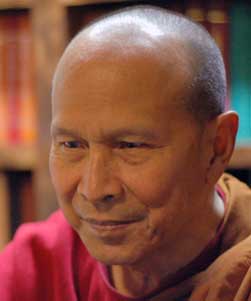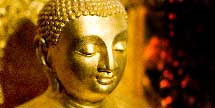About Us
TATHAGATA MEDITATION CENTER
Purpose
 With enlightenment as the ultimate goal in life, the Vipassana Meditation Group was formed under the spiritual guidance of the late Venerable U Silananda in 1987. The group progressed until 1991 when it founded Tathagata Meditation Center (TMC).
With enlightenment as the ultimate goal in life, the Vipassana Meditation Group was formed under the spiritual guidance of the late Venerable U Silananda in 1987. The group progressed until 1991 when it founded Tathagata Meditation Center (TMC).
TMC is located on more than 2.5 acres in San Jose, California. The facilities consist of a Sangha quarters for monks, a meditation hall, separate men and women’s quarters, and a kitchen and a dining area.
The late Venerable U Silananda Sayadaw was the Chief Meditation Teacher of the Center and Venerable U Thuzana Sayadaw is the Abbot. The Advisory Sangha for TMC are Venerable U Pandita Sayadaw, Venerable Khippa Panno Sayadaw and Beelin Sayadaw.
Under the spiritual guidance of TMC’s Sangha, the Board of Directors outlines TMC’s policies and the Executive Branch directs the center’s operations according to the following guidelines:
1. TMC is an environment for mental cultivation and the establishment of mindfulness for reaching Nibbāna, ultimate wisdom, and enlightenment.
2. The purpose of TMC is to promulgate the original teachings of the Buddha and Vipassana Meditation as the only way to attain enlightenment as taught by the Buddha.
3. The mission of TMC is to serve people spiritually by creating suitable conditions for learning the Buddha’s teachings and practicing Vipassana Meditation. This includes organizing Dhamma classes, the free distribution of Dhamma books, and organizing Vipassana meditation retreats.
Vipassana Meditation
Vipassana Meditation is the unique meditation discovered by the Buddha. He practiced this technique to attain enlightenment and then taught it to his disciples and lay devotees. This meditation has been continued and maintained until today. The ultimate goal of Vipassana Meditation is Nibbāna or enlightenment. In the Mahāsatipaṭṭhāna Sutta (The Great Discourse on the Foundation of Mindfulness) the Buddha taught:
“This is the only way, bhikkhus, for the purification of beings,
for the overcoming of sorrow and lamentation,
for the disappearance of pain and grief,
for reaching the Noble Path,
for the realization of Nibbāna,
namely, the Four Foundations of Mindfulness.”
The practice of Vipassana meditation leads meditators to a clear, objective understanding of reality. With this understanding, meditators are able to get rid of ignorance and craving, the source of grasping and suffering. Once the practice is mature, meditators will experience Nibbāna and attain enlightenment, the ultimate emancipation from all sufferings or total freedom.
Vipassana (Insight) Meditation is also known as Mindfulness Meditation or Tathāgata Meditation. It is called Vipassana because it helps meditators gain insight into the common characteristics of impermanence, unsatisfactoriness, and non-self of all conditioned phenomena. It is known as Mindfulness Meditation because the objects of this meditation technique are one or more of the Four Foundations of Mindfulness: the body, feelings (sensations), the mind, and Dhamma objects. It is called Tathāgata Meditation since Boddhisattas who want to become a Buddha (Tathagata) discover and practice this meditation.
Meditation Retreats
 TMC organizes regular (weekend) and special retreats to provide meditators with opportunities to practice Vipassana meditation. Regular retreats take place twice a month, usually two weeks apart, on the weekend. They begin at 5 AM on Saturday and end at 5:00 PM on Sunday. Meditators are welcome to arrive and stay at TMC on Friday night before the retreat starts. The regular retreats are free of charge.
TMC organizes regular (weekend) and special retreats to provide meditators with opportunities to practice Vipassana meditation. Regular retreats take place twice a month, usually two weeks apart, on the weekend. They begin at 5 AM on Saturday and end at 5:00 PM on Sunday. Meditators are welcome to arrive and stay at TMC on Friday night before the retreat starts. The regular retreats are free of charge.
In addition to regular retreats, there are four special retreats each year. The length of each retreat is about one month. For the special retreats, meditators are asked to make donations to cover the retreat expenses such as food, traveling expenses for the meditation teacher and his assistants, and the utilities.
Meditators are advised to bring sleeping bags, blankets and other personal necessities.
The retreat program consists of Vipassana meditation practice, Dhamma talks, interviews, and question and answer sessions. The daily practice during the retreats includes taking precepts and periods of continuous sitting meditation, walking meditation, and mindfully observing all other activities while dining, resting…
Meditators are asked to carefully observe the rules especially during retreats. They are advised to keep noble silence to avoid distractions for themselves and others.
Interviews are set up after the first few days of the retreat for meditators to report their experiences to the meditation teachers. Based on the information provided, the teacher guides the meditators to further progress. Dhamma talks take place daily except Sundays and are recorded for free distribution after the retreat.
Venerable U Thuzana Sayadaw and other TMC’s Sangha lead the regular retreats. Leading special retreats are Venerable U Pandita, Venerable Khippa Panno, Beelin Sayadaw, Sayadaw U Thuzana and other visiting meditation teachers such as Venerable U Lakkhana and Venerable U Pannathami.
Meditation Teachers
The late Venerable U Sīlānanda was ordained as a bhikkhu for more than fifty years. An accomplished scholar, he held the highest degrees in Buddhist scriptures in Burma and taught Buddhism in monasteries and universities in Burma. At the Sixth Buddhist Council in Burma in 1954, he was the chair of a committee in charge of making a Pali-Burmese Dictionary and editing the commentaries and sub-commentaries. At that time he was only 26 years old.
In 1979, Venerable U Sīlānanda accompanied his teacher the late Venerable Mahāsī Sayadaw, the foremost Burmese meditation teacher, on a trip abroad to promulgate the original teachings of the Buddha including Vipassana Meditation. Upon leaving the United States for Burma, Mahāsī Sayadaw assigned Venerable U Sīlānanda to remain in the U.S. to continue the mission at the request of several Burmese and American Buddhists.
Sayadaw U Sīlānanda stayed in the US and taught the Dhamma. He guided meditation retreats in many places in the U.S., Japan, Europe, Sri Lanka, and Mexico. With deep meditation experience and immense knowledge of Buddha’s teachings, Venerable U Sīlānanda explained Buddhism and guided meditation retreats clearly and thoroughly as a compassionate and respectful teacher.
Sayadaw U Sīlānanda is the author of several books written in Burmese and English. “The Four Foundations of Mindfulness” is a definitive exposition on Vipassana Meditation. He was also the abbot of Dhamma Vihara in Half Moon Bay, California and a spiritual leader of Dhammacakka in Berkeley, California. Sayadaw U Sīlānanda passed away in 2005.
The Venerable Khippa Panno Sayadaw is the most well known Vietnamese Vipassana meditation teacher outside of Vietnam. He became a novice monk in 1946 at the age of 16. He then went to Cambodia to learn the Pāli language. At the age of 20, he ordained as a monk and stayed at Tam Bao Tu Temple in the City of Danang, Vietnam. In 1964, he went to India to continue studying Buddhism and graduated with a Master’s degree in the Pāli language. He also studied about Buddhism at Nārada Center for two years.
In 1980, Khippa Panno Sayadaw went to Burma to practice Vipassana meditation with the late Mahāsī Sayadaw. After successfully completing the practice, he came to the U.S. and began teaching Vipassana meditation. He has guided the winter special retreat every year since 1987 (even before TMC was founded). With rich experience, humility, loving-kindness and skillful guidance, he has left many memories in the heart and minds of meditators. He is currently the Abbot of Ky Vien Temple in Washington, D.C. and Chief Meditation Teacher of Thich Ca Thien Vien Meditation Center in Riverside, California.
Sayadaw U Pandita began his noble life by ordaining as a novice at the age of seven in a remote village in Burma. He practiced Vipassana meditation under the guidance of the late Mahāsī Sayadaw and became one of the most famous meditation teacher of his time. Since 1954, he has taught Vipassana meditation to thousands of meditators around the world with compassion and diligence. With vast meditation experience and thorough knowledge of Buddha’s teachings, he has guided meditation retreats for more than 70 years. He began to teach meditation to the Vipassana Meditation Group in 1989 and has come to TMC to teach regularly since it was founded. He is the founder and abbot of the Panditarama meditation centers in Burma.
Beelin Sayadaw is the former Abbot of TMC. In 1945, at the age of 12, he became a novice at Northern Monastery in Heynin Pley village, Bee Lin City, Burma. At the age of 20, he was ordained as a monk and later passed the Dhammacariya examination. He then served as lecturer at Hitakaryi Sangha University. He studied the three Pitakas and commentaries under many renowned teachers. He practiced Vipassana meditation with U Sanvara Sayadaw and later taught Vipassana meditation to monks and lay people at several places in Middle Burma. Sayadaw also taught Vipassana meditation in Liverpool, England for about three years.
Venerable U Zatila became a novice at the age of nine and was fully ordained as a bhikkhu in 1985. He continued to study the Buddhist scriptures from the age of 16 to 31. He began his first meditation retreat in 1996. He began teaching meditation at Panditarama Meditation Center in 1997. In March 2003, he was assigned to TMC by Sayadawgyi U Pandita and stayed at TMC until 2006. While staying at TMC, he helped guide the weekend meditation retreats, the monthly youth classes and the yearly special retreats. Since returning to Burma in 2006, he has returned to TMC twice to lead special meditation retreats.
Sayadaw U Thuzana is the current Abbot of Tathagata Meditation Center (TMC). Before coming to TMC in May 2011, he was the chief meditation master at Malaysian Buddhist Meditation Center (MBMC) in Penang, Malaysia from 2003-2010. From 2000-2003, he was an assistant to Sayadawgyi Panditābhivamsa at Hse-mine-gone Meditation Center in Bago, Myanmar. In this capacity, he taught Vipassana meditation to many local and foreign yogis.
